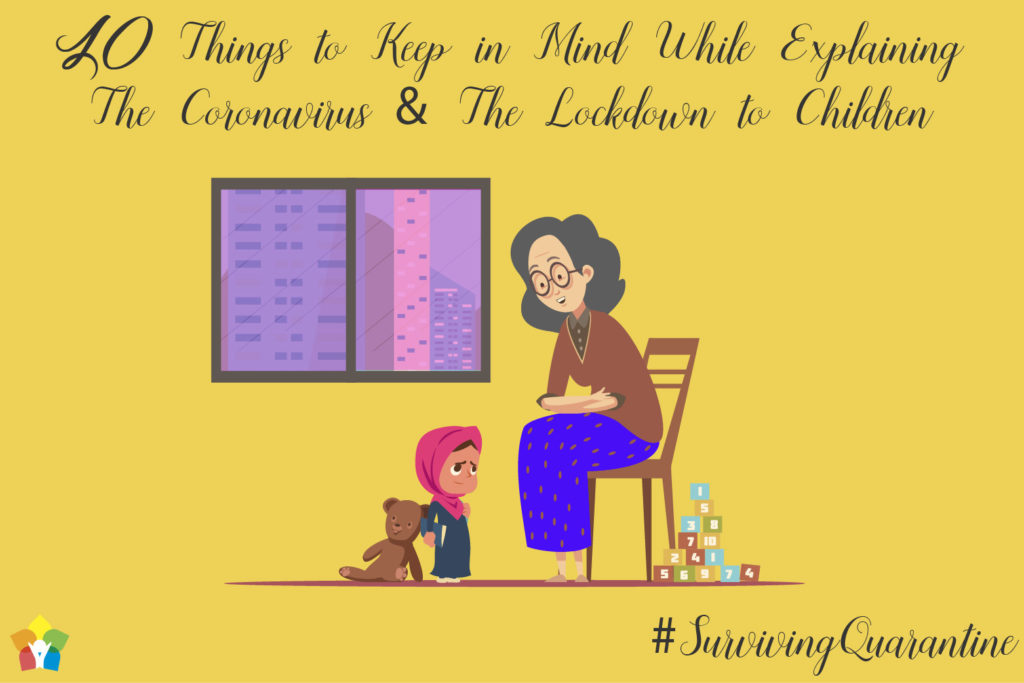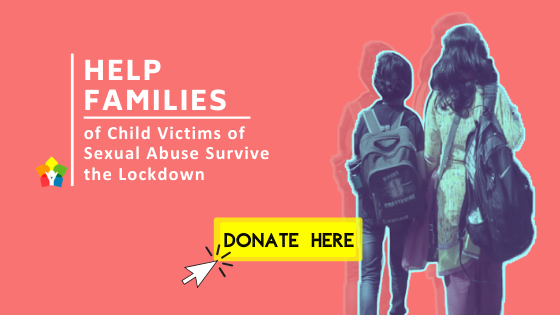10 Things to Keep in Mind While Explaining The Coronavirus & The Lockdown to Children

We all are bombarded with information, news articles and constantly evolving theories around the pandemic, its spread and possible precautions. As we make our way through the overwhelming amount of information, we should help our children understand the current situation.
Here are some simple tips on explaining the coronavirus and the lockdown to children.
1. It’s Okay to Talk About It
By this point, children already know. There is no longer a point in hiding anything. They may have questions around coronavirus, why they are not allowed to play outdoor, why schools are shut etc. If they have access to the internet and news, their pool of information is wider. Talking to them about the situation will help them navigate it better.
2. Share age-appropriate information
To avoid confusion and complexity, share developmentally appropriate information. Use words and concepts children can understand. Gear your explanations to the child’s age, language, and developmental level.
For Pre-Teens:
- Show cartoon videos or comics to explain what is corona virus and how to take precautions against it.
- Use dolls or puppets to play-act symptoms (sneezing, coughing, fever) and tell them what to do if they feel sick (tell their parents immediately). Also make sure to tell them that they need to be empathetic to someone who is sick.
- Emphasize that children can do a lot to keep themselves and others safe. For example, introduce the concept of social distancing & other safety measures.
- Help children understand the basic concepts of disease prevention and control. Use exercises that demonstrate how germs can spread. For example, you can put coloured water in a spray bottle and spray it on a piece of white paper, then observe how far the droplets travel.
- Demonstrate why it’s so important to wash hands for 20 seconds with soap. For example, put a small amount of glitter in the child’s hand and have them wash them with just water and notice how much glitter remains. Then have them wash for 20 seconds with soap and water and see how the glitter is gone.
For Teens:
- Teenagers may already have consumed large quantities of information from the media, internet and friends. One of the important things that parents can do is to listen and help them sort out confusions and fears they bring up.
- Try to answer honestly when teens are asking about the virus or lockdown. They may have access to other resources also to crosscheck. If you don’t have an answer to something, its okay to say so.
- Teens may be mature enough to take on some responsibility. Encourage them to wash their hands, maintain social distancing etc. Tell them how these small acts are helping them and others to be safe.
3. Explain That You are Not In Control of the Lockdown
You can describe the lockdown as an emergency protocol that prevents people from leaving a given area. The current lockdown is to stop the spreading of the virus. But it doesn’t mean everything is shut. Grocery stores, ATMs or pharmacies are still functional and if needed one can make few and far between trips to stock up. Currently India has extended the lockdown till 3rd May. But it is uncertain and there’s not much in our hands. Be honest in your communication.
4. Remind Them That Social Distancing is Not Social Isolation
Social distancing isn’t social isolation. Its a basic and temporary safety measure that keeps you and everyone around you safe. They can stay in touch with their peers through the internet and phone.
5. What if your house is under Containment
Tell them that there is no need to panic. Tell them that this is an added measure of protection for their safety and it mostly won’t last more than a week. If they seem too anxious, once the containment is lifted, take them on a safe and guided outing to the nearest general store.
6. What if your family is shifted into Observation & Quarantine
Make it clear to your children that this does not mean that any of you have the virus yet. You are not sick. You are being moved to a secure location where you are safer than you are at home. Tell your children that they will not be alone and that either of the parents will be with them. Tell them to carry soap, hand sanitizers, masks, disinfectant with them as they are being shifted. If you need to reach out to counsellors 08046110007 is the number to the NIMHANS helpline.
7. Put News Stories in Context
Watch the news with your kids at least once a day in the evenings so you can filter and process the news together.
8. It is Okay to Talk about Fear or Anxiety
All the information around the Lockdown and pandemic may make children overwhelmed. Introducing the meaning of anxiety isn’t going to make them feel anxious, instead, it may help them process their emotions. Here’s how you can talk about anxiety to children and teens. But be mindful of not passing your own anxiety or fear to children. Don’t overwhelm them with too much information. Encourage them to express and communicate their feelings. Discuss the different feelings they may be experiencing and explain that these are normal reactions to an abnormal situation.
9. Emphasize All Sides of the Situation.
Let children know that people are also recovering from the virus. There are lots of people helping the people affected by the coronavirus outbreak. It is a good opportunity to show children that when something scary or bad happens, there are people to help. At the same time, you may discuss with empathy & sensitivity the troubles that migrant workers in the country are going through.
10. Say no to bullying, discrimination and stigmatization
While talking about Corona virus parents have to be mindful of not perpetuating any stigma. For example, talking about the coronavirus disease but don’t attach any ethnicity, specific populations or racial background to the disease.
Read some do’s and don’ts for how to talk about the coronavirus with children.
(If you like this article, please consider donating to our ongoing donation drive to Help Families of Sexual Abuse Victims in Mumbai Survive the Lockdown)








